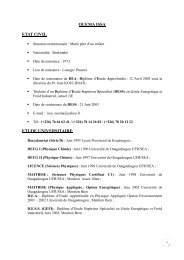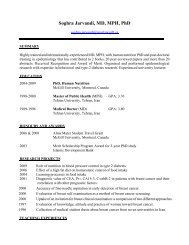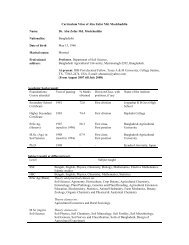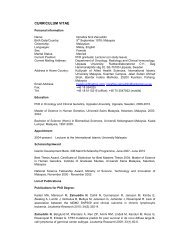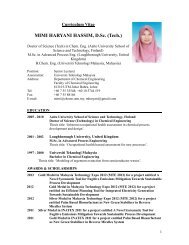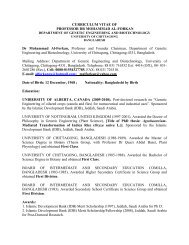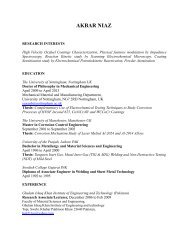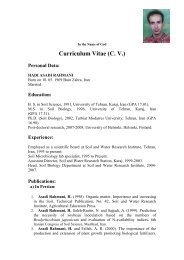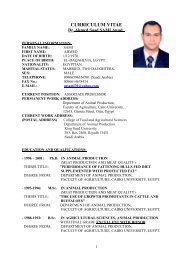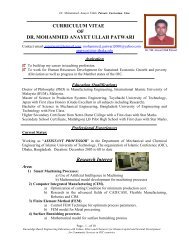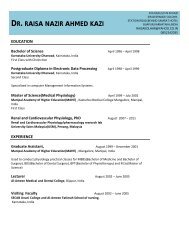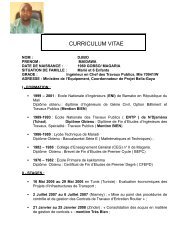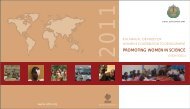Engineering: issues, challenges and opportunities for development ...
Engineering: issues, challenges and opportunities for development ...
Engineering: issues, challenges and opportunities for development ...
Create successful ePaper yourself
Turn your PDF publications into a flip-book with our unique Google optimized e-Paper software.
ENGINEERING: ISSUES CHALLENGES AND OPPORTUNITIES FOR DEVELOPMENTfer plat<strong>for</strong>m, specific to their own contexts. APCTT has alsodesigned the APTITUDE Search Engine to help seekers oftechnology simultaneously search several technology databasesthat are in the public domain.To ensure that a holistic approach is taken in the planning<strong>and</strong> management of technology transfer, APCTT is currentlypromoting a ‘National Innovation Systems’ approach in countriesof the Asia-Pacific region. The aim is to influence policymakersso that they appreciate the relevance <strong>and</strong> importanceof the NIS approach, <strong>and</strong> to develop policy frameworks thatensure the effective <strong>development</strong> <strong>and</strong> transfer of innovationsin industry, research <strong>and</strong> <strong>development</strong> institutions, <strong>and</strong> inuniversities. APCTT is also implementing a project on GrassrootsInnovation to help member countries scout, document<strong>and</strong> eventually commercialize such innovations with a viewtowards promoting inclusive <strong>development</strong> <strong>and</strong> social entrepreneurship.4.3.10 The African Network ofScientific <strong>and</strong> TechnologicalInstitutions (ANSTI)Jacques MoulotIn Africa, engineers <strong>and</strong> scientists have traditionally organizedthemselves in networks based around disciplines. Suchnetworks are often professional associations with political oradministrative purposes aimed at addressing gaps affecting theprofession <strong>and</strong> careers of engineers <strong>and</strong> scientists. Networksaimed at human resource capacity-building are less common.According to Massaquoi <strong>and</strong> Savage 17 there are mainly twotypes of such capacity-building networks at regional level inAfrica: regional centres of excellence <strong>for</strong> training <strong>and</strong> research<strong>and</strong> regional institutional networks.The African Network of Scientific <strong>and</strong> Technological Institutions(ANSTI) is an example of the latter. Established in 1980 byUNESCO, ANSTI is arguably one of the oldest alliances dealingwith science in Africa. It draws its political m<strong>and</strong>ate from thefirst Conference of Ministers Responsible <strong>for</strong> the Applicationof Science <strong>and</strong> Technology to Development in Africa organizedin 1974 <strong>and</strong> its operational m<strong>and</strong>ate from its members<strong>and</strong> partners.The membership of ANSTI currently comprises 174 universitydepartments <strong>and</strong> research centres, following a 77 percent increase since 1999. The members are located in 35 sub-17 Massaquoi, J.G.M. <strong>and</strong> Savage, Mike (2002) Regional Cooperation <strong>for</strong> capacity buildingin science <strong>and</strong> technology. Popularisation of science <strong>and</strong> technology education:Some Case Studies <strong>for</strong> Africa. By Mike Savage <strong>and</strong> Prem Naido (Eds). CommonwealthSecretariatSaharan African countries. An estimated one-third of themembers provide engineering degrees in various disciplinesof engineering. The network functions with a light <strong>and</strong> costeffective structure composed of a secretariat in charge of thedaily operation <strong>and</strong> implementation of the activities of thenetwork, <strong>and</strong> a Governing Council that meets once a yearto approve the budget <strong>and</strong> provide policy guidelines <strong>for</strong> thenetwork.ANSTI provides capacity-building services <strong>and</strong> <strong>opportunities</strong>to scientists <strong>and</strong> engineers at its member institutions.These include awards <strong>and</strong> fellowships <strong>for</strong> postgraduatetraining, grants <strong>for</strong> travel to <strong>and</strong> <strong>for</strong> the organization of conferences,<strong>and</strong> funds <strong>for</strong> visiting professorships. As in any network,in<strong>for</strong>mation exchange is emphasized. ANSTI pools theresources of its members <strong>and</strong> seeks partnerships <strong>and</strong> supportfrom donors to attain its specific objectives (highlighted inthe Box). Up to 2008, among other activities, it had provideddifferent types of grants to more than 300 staff of memberinstitutions; facilitated more than 50 staff exchange visits;granted over eighty-five postgraduate fellowships <strong>for</strong> trainingof which 35 per cent in the fields of engineering, <strong>and</strong> providedmore than ninety grants to scientists <strong>and</strong> engineers toattend conferences.The main objectives of ANSTIThe objectives of ANSTI, as detailed in its 2007–2011 strategic planare:■■To strengthen the staff of science <strong>and</strong> engineering traininginstitutions.To facilitate the use of African scientists in the diaspora tostrengthen teaching <strong>and</strong> research in science <strong>and</strong> engineering inuniversities.■ To promote the use of In<strong>for</strong>mation <strong>and</strong> CommunicationTechnology (ICT) in the delivery of science <strong>and</strong> engineeringeducation.■To facilitate the sharing of scientific in<strong>for</strong>mation <strong>and</strong> strengthenthe coordinating mechanism of the network.■ To strengthen research activities in relevant areas of Science &Technology.■To provide a <strong>for</strong>um <strong>for</strong> the discussion of strategic <strong>issues</strong> inscience <strong>and</strong> engineering education (including <strong>issues</strong> of quality<strong>and</strong> relevance).Excerpt from ANSTI Strategic Plan 2007–2011One of the important activities of any capacity-building programmeis the identification <strong>and</strong> discussion of strategic <strong>issues</strong>involved in the relevant fields of education. ANSTI, throughthe meetings of deans <strong>and</strong> other expert groups, has in the pastidentified several <strong>issues</strong> that affect science <strong>and</strong> technologyeducation in Africa. The network has established a biennial150



